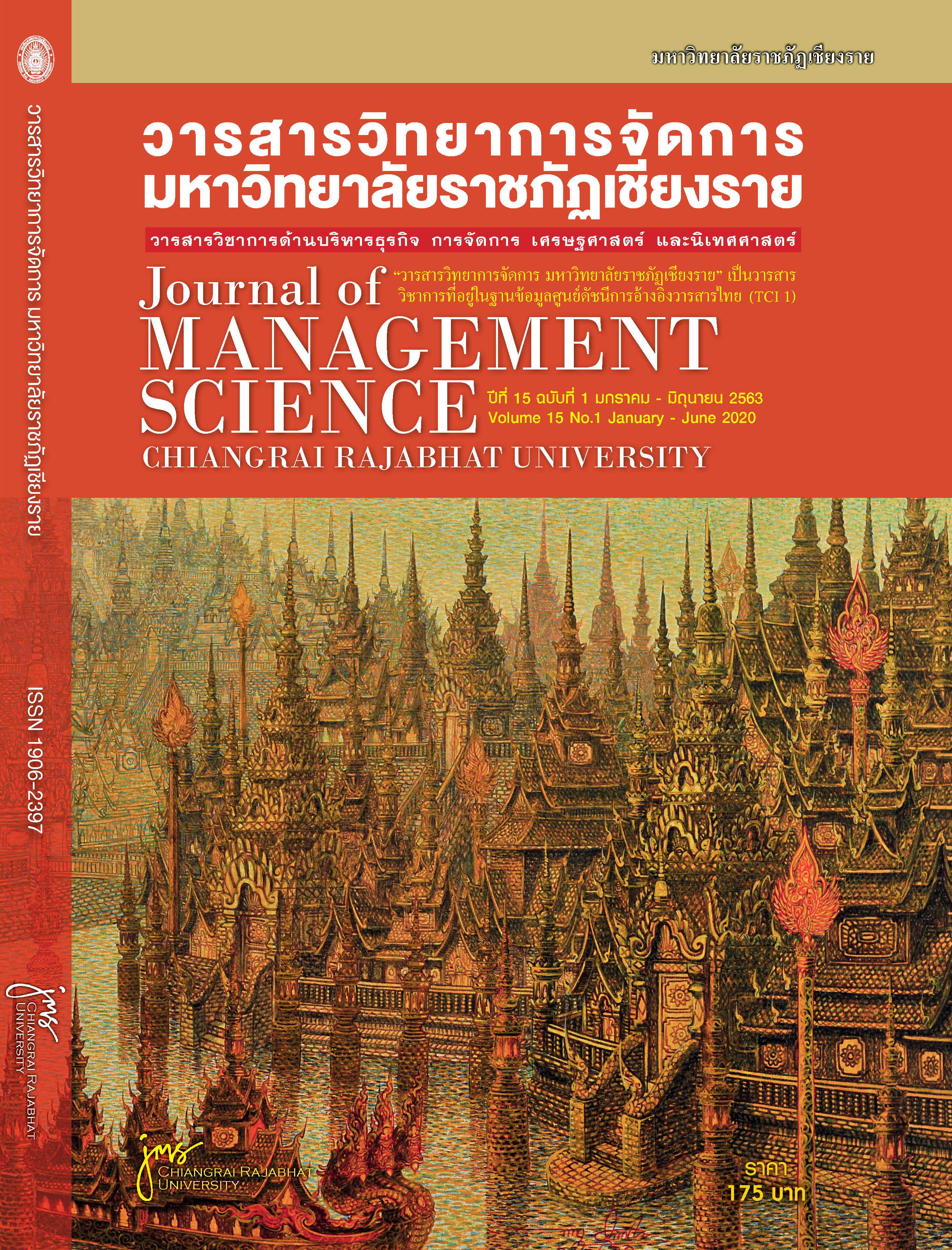The Guidelines for Developing Competitive Advantage of Wellness Tourism Business in Phuket
Main Article Content
Abstract
This research aims to: (1) investigate the situation of health promotion tourism businesses in Phuket (2) to study the competitiveness of the health tourism businesses in Phuket and (3) to propose ways to improve the competitiveness of the health tourism business in Phuket. The study was conducted by means of qualitative research. The primary informants are the health promotion travel agencies in Phuket, including academics, government agencies, and private organizations related to specific criteria. The instruments used for the study were questionnaires, SWOT analysis, TOWS analysis, and community survey through content analysis. As a result, it has been found that (1) Relaxation business group, consisted of spa business is the main service that generates revenue with the highest number of entrepreneurs. As far as health care is concerned, the trend and popularity of health care is increasing. With Phuket's reputation as a destination for global travel, the concept of business establishment has a clear advantage in terms of investment. (2) Analyzes of business capabilities show that the health promotion tourism businesses in Phuket have the capability of being in the high level businesses, comprised of related business services for physical fitness, Healthy Nutrition, Diet and Health promotion business in Phuket. Those with moderate business capability are Beauty Care, Relaxation, Meditation and Mental Activity and Education Business. Overall, the impetuses for new competitors of entries, bargaining power of the manufacturer and the bargaining power of tourists have a lower effect on the business. However, substitute products and competition in the industry have had a moderate impact on the ability of the business. Therefore, the development of the competitiveness of the health promotion tourism business in Phuket Province so called “I-MVS” to development: (1) Integrated (2) Marketing (3) Value Creation Proposition. (4) Service Design
Article Details
Views and opinions expressed in the journal do not necessarily reflect those of the editors.
References
Boonyarataphan, T. (2010). SWOT Analysis and TOWS Matrix. Retrieved December 12, 2015, from https://www.drmanage.com/index.php?lay=show&ac=article&Id= 538632242. (in Thai).
Chaiphawang, K. (2015). Digital Marketing: New Market Chanel for the Changed World. Journal of Management Science Chiangrai Rajabhat University. 10(1). 123-138. (in Thai).
Department of Health Service Support. (2015). Department of health Service Support, the policy-driven Medical Hub seamlessly to the city. Healthcare excellence in health services. Retrieved December 12, 2015, from https://www.thailandmedicalhub.net:8443/ display_news.jsp?id=N00000002198. (in Thai).
Department of Tourism. (2013). Health Tourism Management in Hotel / Resort. Bangkok : Ministry Of Tourism and Sports. (in Thai).
Esichaikul, R. & Chanpayom, B. (2013). The Development Strategies to Promote Thai Spa Businesses as Spa Academy for ASEAN. Bangkok : National Research Council of Thailand. (in Thai).
Global Spa Summit & SRI International. (2010). Spas and the Global Wellness Market: Synergies and Opportunities. Retrieved May 1, 2010, from https://www.sri.com/sites/ default/files/publications/gss_sri_spasandwellnessreport_rev_82010.pdf.
Global Wellness Institute. (2013). WELLNESS NOW A $3.72 TRILLION GLOBAL INDUSTRY–WITH 10.6% GROWTH FROM 2013-2015. Retrieved June 1, 2017, from https:// www.globalwellnessinstitute.org/ wellness-now-a-372-trillion-global-industry.
Global Wellness Institute. (2017). Global wellness economy monitor. Retrieved January 15, 2017, from https://www.globalwellnessinstitute.org/industry-research.
The Global Wellness Tourism Economy. (2013). THE GLOBAL WELLNESS TOURISM ECONOMY 2013. Retrieved May 20, 2017, fromhttps://www.itbkongress.de/media/itbk/Archive_2014/ ITB_Experts_Forum_Wellness_3 /The_Global_Wellness_Tourism_Economy_2013.pdf
Karndee, P. & Soontornchai, S. (2005). Health Promotion (SPA). Sukhothai Thammathirat University Journal. 18(2). 104-108. (in Thai).
Müller, H. & Kaufmann, E. L. (2000). Wellness Tourism: Market Analysis of a Special Health Tourism Segment and Implication for the Hotel Industry. Journal of Vacation Marketing. 7(1). 5-17.
National Health Act. (2007). The Government Gazette. Bangkok : J.S.Printing. (in Thai).
Nigel P. & William G. (1989). Making SWOT Analysis Work. Marketing Intelligence & Planning. Journal of Marketing Practice: Applied Marketing Science. 7(5/6). 5-7.
Office of Small & Medium Enterprises Promotion. (2013). Strategy and Action Plan for Small and Medium Enterprises. Retrieved August 11, 2017, from https://www.sme.go.th/th/ images/data/SR/ download/ 2014/07july/2056.pdf. (in Thai).
Office of the National Economics & Social Development Board. (2016). The 12 th National Economic and Social Development Plan (2017-2021). Bangkok : The Prime Minister’s Office All Rights Reserved. (in Thai).
Porter, M. E. (1980). Competitive strategy: Techniques for analyzing industries and competitors. New York : Free Press.
Porter, M. E. (1991). Towards A Dynamic Theory of Strategy. Strategic Management Journal. 12. 95-117.
Robert, J. C. Z. (2011). Simple Tools and Techniques for Enterprise Risk Management. 2 nd ed. New York : John Wiley & Sons.
Somnuxpong, S. (2017). Trends and Tourism marketing 4.0 in Thailand. Veridian E-Journal, Silpakorn University. 10(3). 2055-2068. (in Thai).
Wandee, C. (2008). Marketing Strategy Analysis of Spa Businesses Entrepreneurs in Mueang Chiang Mai District. Master of Business Administration, Chiang Mai University. Chiang Mai. (in Thai).
Wongkit, M., & McKercher, B. (2013). Toward a typology of medical tourists: A case study of Thailand. Tourism Management. 38. 4-12.
World Health Organization. (1998). Review of the Constitution of the World Health Organization: report of the Executive Board special group. Meeting on January 22, 1998. Geneva.


